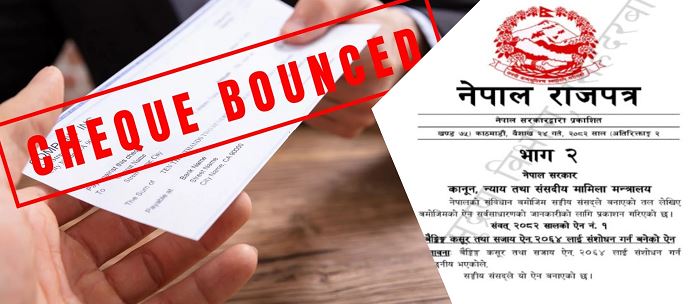By Dipesh Ghimire
Nepal Enacts New Law on Cheque Bounce Cases: Police Investigation Made Mandatory, Punishment Reclassified

The Government of Nepal has amended the Banking Offenses and Punishment Act, 2064 (2008 AD), bringing sweeping changes to how cheque bounce cases are handled—ranging from the legal process, investigation mechanism, limitation periods, and penal provisions.
1. Police-Only Complaint System Introduced
As per the revised law published in the Nepal Gazette on Wednesday and now in effect, cheque bounce complaints must first go through police investigation. Previously, aggrieved parties could directly file cases in court, bypassing law enforcement. The amendment removes that option.
Additionally, the Negotiable Instruments Act, 2034, particularly Section 107(A), which previously governed cheque dishonor penalties, has now been repealed to avoid overlapping jurisdiction. Now, the Banking Offense Act will serve as the sole applicable law for such offenses.
2. Reduced Limitation Period
The timeframe within which a case can be filed has been drastically shortened. While earlier the statute of limitations for dishonored cheques was five years, the new law mandates that:
A police complaint must be filed within 1 year of the cheque bounce.
Once filed, a court case must be initiated within 6 months from the police complaint.
This shift places a greater burden on victims to act promptly.
3. Mandatory 45-Day Notice to Issuer
Before initiating any legal proceedings, the cheque holder must provide a 45-day written notice to the issuer after the cheque bounces. This notice serves as a final opportunity for the issuer to deposit the required funds into the account.
The amended Section 3(k)(3) of the Act states that banks and financial institutions are required to inform the issuer through any appropriate medium and keep a record of this communication, allowing 45 days to settle the amount.
4. New Penalty Structure Based on Loss (Bigo)
Penalties have been restructured to be proportional to the amount involved, and the previously mandatory 100% penalty has been scrapped. Now:
The issuer must pay the principal amount, legal interest, and an additional 5% penalty on the total due.
Imprisonment terms are now tiered:
Up to NPR 1.5 million: Up to 1 month
NPR 1.5M–5M: 1 to 3 months
NPR 5M–10M: 3 months to 1 year
NPR 10M–100M: 1 to 2 years
Above NPR 100M: 2 to 4 years
This graduated approach aims to match the severity of punishment with the financial damage caused.
5. Provision for Reconciliation (Milapatra)
The new law formally includes the possibility of reconciliation or settlement between the parties. While such arrangements were previously permitted under the Criminal Procedure Code, they are now directly acknowledged in the Banking Offenses Act, making it legally more accessible and enforceable.
6. No Requirement to Prove Source of Cheque Funds
Interestingly, the revised law does not require the cheque issuer to disclose or justify the source of the funds mentioned in the cheque. The focus remains strictly on whether the cheque was honored or dishonored.
This legislative reform represents a shift towards a more formal, time-bound, and structured mechanism for handling cheque dishonor in Nepal. It prioritizes police involvement, aims to unclog the judiciary, and streamlines how and when complaints can be filed.
However, the shortened limitation period may pose challenges for ordinary citizens unfamiliar with legal deadlines. The mandatory 45-day notice adds a procedural safeguard for issuers, possibly reducing frivolous or premature cases.
The scaled-down penalties and the opportunity for reconciliation make the new system appear more balanced—protecting genuine victims while offering leeway for honest mistakes to be rectified before criminal proceedings escalate.









